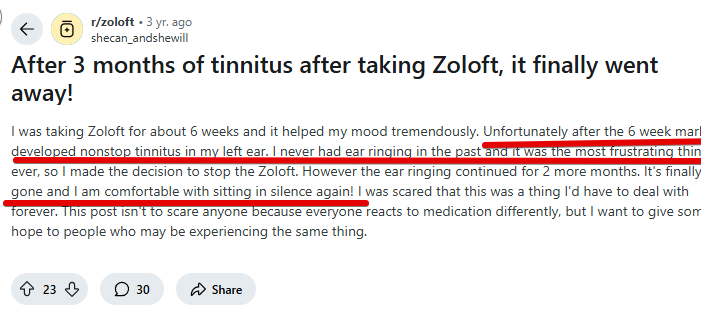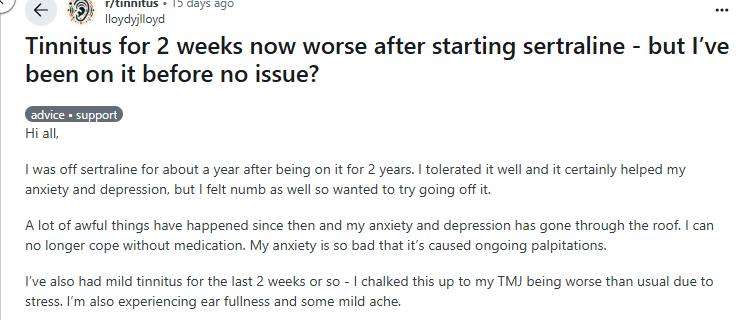Tinnitus, known as the perception of ringing or buzzing in the ears, affects many people and can become particularly bothersome when it interferes with daily life.
It is often linked to factors such as stress, anxiety, and depression, and many folks find that when their mental health is off, the noise in their ears seems to get louder.
In parallel, Sertraline, which is sold under the brand name Zoloft among others, is one of the most widely prescribed selective serotonin reuptake inhibitors (SSRIs) used to treat depression and anxiety.
With the increasing number of patients who experience both tinnitus and mood disorders, the question arises: Can Sertraline ease the symptoms of tinnitus or might it actually make it worse?
In this article, I will walk you through the key points and research findings to help you understand how Sertraline might impact tinnitus and what you should keep in mind if you are considering its use for managing your symptoms.
What is Sertraline?
Sertraline is a medication most commonly used to treat depression, anxiety, post-traumatic stress disorder (PTSD), and other related conditions.
As an SSRI, it works by altering the chemical balance in the brain, particularly by increasing the level of serotonin in the nervous system, which helps improve mood and reduce anxiety.
While its primary function is not directly related to tinnitus management, the effects of reducing anxiety and depression can sometimes indirectly impact tinnitus symptoms.
Since mood disorders can often heighten the awareness of bodily sensations, including tinnitus, many doctors prescribe Sertraline to patients who suffer from both depression and tinnitus.
It appears that by improving a person’s mental state, Sertraline may help lessen the burden of tinnitus, even if it does not directly target the ringing in the ears. However, the relationship between this medication and tinnitus is far from straightforward, which brings us to a discussion of its potential benefits and risks.
Recommended Reading: Does Clonazepam Help With Tinnitus?
How Sertraline Could Ease Tinnitus?
One of the reasons why some patients report improvement in tinnitus symptoms when taking Sertraline is its effectiveness in reducing anxiety and depression.
Given that tinnitus often becomes more noticeable and bothersome as stress levels rise, addressing underlying mental health issues can play a significant role in the overall perception of tinnitus. When a person’s anxiety diminishes, they might find that the ringing in their ears does not dominate their focus as much.
Improved sleep is another beneficial outcome observed with the use of Sertraline. For many individuals, tinnitus can interfere with restful sleep, leading to a vicious cycle of fatigue and heightened symptom awareness. By promoting better sleep quality, Sertraline indirectly assists in reducing the focus on the tinnitus noises. This means that people can wake up feeling more rested, potentially diminishing the intensity of their tinnitus during the day.
Furthermore, there is the indirect benefit of calming the brain’s response to tinnitus. When the mind is less occupied with distress and anxiety, it becomes easier to ignore or habituate to the constant background noise.
This lays the groundwork for a more holistic approach where mental health management serves as a key element in tinnitus care. In some cases, patients have noted that as their overall mood improves, they are better able to cope with the intrusive nature of tinnitus. This suggests that the benefit of Sertraline can sometimes extend beyond its specific psychiatric effects.
How Sertraline Might Aggravate Tinnitus?
While there are clear reasons why Sertraline might bring relief to some individuals with tinnitus, it is equally important to recognize that the medication is not free of side effects.
One documented side effect associated with the use of SSRIs, including Sertraline, is tinnitus. This paradoxical effect has been reported by some patients who start the medication or adjust their dosage, and they experience a sudden increase in the perception of ringing or noise in the ears.
A significant point of concern is that for some users, the onset or worsening of tinnitus symptoms might occur shortly after beginning the treatment.
The underlying cause for this aggravation could be linked to how the medication alters the brain’s chemistry. As the level of serotonin increases, the auditory pathways in the brain could react unpredictably in certain individuals, leading to heightened awareness or even intensification of tinnitus.
Additionally, any medication that acts on neurotransmitter levels can have a varied effect depending on each person’s unique brain chemistry. For some, these adjustments might lead to short-term sensory disturbances, including tinnitus. It is important to note that in many cases, these sensations may be temporary, occurring primarily during the initial adjustment phase or when the dosage is modified.
The possibility of side effects should be weighed carefully in discussions with a medical professional.
When I get folks who come into the pharmacy, I often tell them to speak to both a doctor and an ENT. I have not tried Sertraline, and I hope that it does not come to the point of having to take it.
User Experiences: Real-World Feedback
The feedback from individuals who have used Sertraline for conditions related to anxiety and depression is quite diverse when it comes to tinnitus.
Numerous online forums and patient communities, such as those found on Reddit, Tinnitus Talk, and WebMD, offer a window into real-world experiences that vary widely from one person to another.
Many users share positive stories about how their tinnitus symptoms became less intrusive after starting Sertraline.

They explain that as they developed a more balanced mood and experienced less anxiety, their focus on the ringing in their ears diminished. For these individuals, the medication acted like a buffer that helped them cope with the constant noise, allowing them to reclaim moments of peace throughout their day.
On the other hand, there is an increase in tinnitus severity upon the commencement of Sertraline treatment. These users have noted that, even if the medication assists with reducing anxiety, it sometimes simultaneously causes an escalation in the tinnitus sound.

This paradox has left some patients frustrated and searching for alternative solutions. Such variability in response underlines the importance of personalized treatment plans and careful symptom tracking.
Bottom Line: What works wonders for one person might trigger unexpected side effects in another.
Tips if You’re Taking or Considering Sertraline for Tinnitus
If you are considering Sertraline for managing conditions related to both mental health and tinnitus, several practical tips might help you make informed decisions and manage any potential side effects effectively.
First, it is essential to have a thorough discussion with your doctor about the risks and benefits.
Your healthcare provider can review your medical history, assess your overall health, and make a tailored recommendation based on your specific circumstances. As with any medication, starting with a lower dose and gradually increasing it with medical supervision can help minimize side effects.
Keeping a detailed journal of your symptoms can also be useful.
This journal should include notes on the intensity of your tinnitus, the timing of any changes, and how these correlate with your medication adjustments.
If you notice any worsening of tinnitus or other concerning side effects, do not hesitate to contact your healthcare provider.
They might adjust your dosage or suggest an alternative treatment. It is very important never to stop taking Sertraline abruptly, because sudden discontinuation can lead to a range of withdrawal symptoms, some of which may also affect your tinnitus.
While monitoring your symptoms, consider discussing with your doctor the possibility of integrating other therapies that support mental health and tinnitus management. In some cases, a combination of regular medication reviews and adjunct therapies such as cognitive behavioral therapy (CBT) may offer an overall benefit.
Alternatives to Consider
Since the response to Sertraline can vary from person to person, it makes sense to be aware of alternative strategies that might help manage both tinnitus and the related mental health issues
. A variety of alternative approaches can complement or even substitute for the direct use of pharmaceuticals like Sertraline.
Cognitive Behavioral Therapy (CBT) is one effective method that helps people manage the distress associated with tinnitus. Rather than focusing solely on the sound, CBT works on changing the way you think about and react to tinnitus, which can reduce its disruptive impact.
Sound therapy is another promising option. Devices such as white noise machines or environmental sound apps create background sounds that can help mask the tinnitus noise. This form of therapy is designed to reduce the contrast between silence and the irritating sounds, making them less noticeable throughout the day and night.
Natural supplements have also gained attention in some circles. Nutrients like magnesium and taurine are sometimes explored as potential supportive treatments for tinnitus.
While the research on these supplements isn’t definitive, some people report a decrease in symptoms after incorporating them into their routine.
Additionally, for individuals with hearing loss and tinnitus, hearing aids with tinnitus masking features may provide relief. These devices not only amplify sounds but often come equipped with noise generators that can provide a soothing background sound, which might help distract from the tinnitus noise. Reviews on hearing aids and related technologies are widely available to help guide individuals in making informed decisions.
Recommended Reading: Sound Oasis Bluetooth Tinnitus Sound Therapy System Review
Final Thoughts: Is Sertraline Right for You?
Deciding whether to use Sertraline as a part of your tinnitus management strategy can feel like a tough decision. The medication might help by reducing anxiety and depression, both of which often exacerbate tinnitus, but it also carries the possibility of increasing the perceptual awareness of the ringing in your ears for certain individuals.
Tinnitus itself is a complex condition that interacts with various environmental, physiological, and psychological factors, meaning that there is no one-size-fits-all solution.
The bottom line here is that mental health plays a very important role in how tinnitus is experienced. Trust your body’s signals and take every change in symptoms as a cue to revisit your treatment plan with a health professional. Ultimately, managing tinnitus becomes an aspect of life that is easier to steer through when you remain proactive and well informed.
What I learned from managing my tinnitus is that what works for other Tinnitus sufferers may not necessarily work for me. It is important not to get discouraged and try to find things that work for you and stick with them.
Lift yourself with knowledge and practical strategies so that you can make decisions that truly suit your needs.
In summary, while there is no universal remedy for tinnitus, combining medical treatment with lifestyle modifications and community support may be the best route to achieving a better quality of life.
Remember, your experience is unique, and continuous evaluation in close consultation with trusted healthcare professionals is very important.
Related Resources
I have other articles or resources that include insights on mental health management alongside practical tips for tinnitus, ensuring you have access to a wide range of strategies when it comes to handling both tinnitus and its related mental challenges.
Go ahead and check it out, and feel free to drop me a comment or any questions that you may have below.
Good Luck and Take Care
Regards
Roopesh
